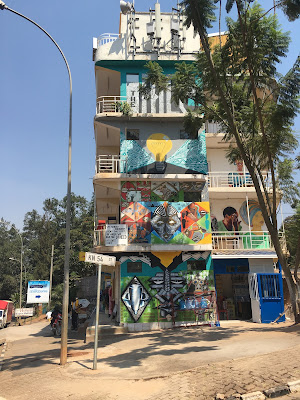Since I last wrote, I survive my first weekend and began my
internship with WE-ACTx!! My overall impression of Kigali thus far can be
summed up as hectically relaxed. It seems ironic, but I have never met people
who walk so calmly through chaos like Rwandans do. I’ll continue to elaborate
throughout this post, and hopefully you will come to agree with my conclusion.
 |
| Me at an Italian Restaurant in Kigali |
I’d like to start off by describing some valuable lessons
I’ve observed since my arrival last Thursday. First, people will stare at your
white skin no matter where you go. They like to touch you, grab onto the car
you’re in, and ask you to take their picture. The man pictured below ran up to
me on the street as I was on my way to the market and insisted that I take his
picture. His face lit up when he saw himself and made me promise to tag him on
facebook.

My pale skin also caught the attention of the head nurse at
WE-ACTx. She began explaining a fantastical gel that comes from Europe and the
United States that protects fair skin. She recommended that I bring it from my
country since it cannot be found here. I told her this gel is a lotion, and it
is called sunscreen. I reassured her that I had put some on that morning. Second,
traffic laws are frequently “forgotten” here. Motos (little motorcycles) are
the most abundant form of public transportation, and they like to weave in and
out of cars. Taxis are also popular, and have a funny habit of turning off
their engines as they coast down large hills. Not only really dangerous, but also
very cost inefficient because restarting their engines takes up more gas than driving
down the hills. Oh well, I wasn’t about to argue. Third, instead of squirrels
running around, Rwanda has stray black cats. Finally, Kinyarwanda is an
extraordinarily hard language to master. So far, I have learned how to say good
morning: mirewe, thank you: marakozi, How are you?: amakuru, and good: ineza.
Exercise caution when sounding these out, I mostly likely spelled all of them
incorrectly.
Everyone at the clinic has been very welcoming. My first day
was spent shadowing the head nurse. I sat in on all of her consultations in the
morning. Every patient has a blue booklet that contains all of their health
records that WE-ACTx keeps on file, and the patients bring in a white slip of
paper to schedule their next visit. Although all conversations were in
Kinyarwanda, I grasped what each person was saying because they’re very
expressive when describing their ailments. After each patient left, the nurse
would give me an overview of the conversation. Most patients are healthy and
take their medication. She looks for warning signs like lower back pain, headache,
and upset stomach. If patients express these symptoms, she sends them to the
lab for testing because they could have typhoid or malaria. For example, one
patient we saw had typhoid last week. The number of patients diagnosed with
malaria varies each month, but 0-12 is the typical range.
After lunch I was able to work in the Pharmacy. I packed Cotrimoxazole, an antibiotic
recommended for HIV patients with a CD4 count less than 500. I sorted 30 pills
into individual bags in preparation for distribution the next day. For a reference, it takes 4 years and roughly $200,000 to receive a pharmacy degree
in the United States. I sat down as a pharmacist and began practicing with less
than 10 seconds of instruction. Below are some pictures taken at the clinic.
Tomorrow is children’s day at the clinic, and I will be
shadowing the youth director. I’m very excited to share my next experiences
with you.
Signing off.
-E







































